Fight for an Anti-War Government
•
No War Against Syria! No Drones, No Mercenaries!
Cuba
• Cuba Remains Committed to its Irrevocable Decision to Advance its Socialist Development
• Second “5 Days for the Cuban 5 in Washington, DC”
Fight for an Anti-War Government
No War Against Syria! No Drones, No Mercenaries!
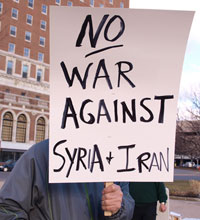 According to news reports, the U.S. and Israel confirmed that Israel bombed Syria May 4. This is the second time this year that Israel has used aggression against Syria, violating Syrian sovereignty and committing crimes against the peace. Lebanon reports Israel has been flying over the country for four days, violating her sovereignty as well.
According to news reports, the U.S. and Israel confirmed that Israel bombed Syria May 4. This is the second time this year that Israel has used aggression against Syria, violating Syrian sovereignty and committing crimes against the peace. Lebanon reports Israel has been flying over the country for four days, violating her sovereignty as well.
Israel claims to have targeted a shipment of missiles, which they “believed” were headed for Lebanon and Hezballah in particular. In this manner, simply stating that weapons “may” be headed to Lebanon and “may” be sent to Hezballah is given as sufficient justification for unleashing use of force and bombing another country.
Israel, mirroring the U.S., justifies aggression and dictating trade and political affairs between two other countries. Hezballah is a recognized political organization in Lebanon, including having elected representatives. It is up to the people of Lebanon and Syria to resolve their own affairs, without outside interference. This bombing, and justification for it, serves to wreck these international norms and contribute to further chaos.
The U.S. did not denounce the Israeli aggression. It has also made certain that Israel retains military superiority in the region. The U.S., the biggest arms dealer in the world, known for funding death squads in Latin America and mercenaries in Africa, is the main supplier of billions in arms to Israel. The arms include nuclear weapons, bunker busters using depleted uranium and bombs using the chemical weapon white phosphorous.
Far from opposing Israeli aggression and itself refraining from interference in the internal affairs of Syria and Lebanon, President Obama used the occasion to threaten increased use of force against the Syrian people. In several press conferences, April 30 at the White House, May 2 (in Mexico) and 3 (in Costa Rica), Obama outlined current U.S. interference in Syria and the potential for increased action, short of U.S. “boots on the ground.”
He emphasized April 30, “We have worked to strengthen the opposition. We have provided non-lethal assistance to the opposition. We have applied sanctions on Syria.” He reiterated May 2, “We are the largest contributor of non-lethal aid to the opposition. We’ve mobilized 80 countries to support the opposition. We are working to apply every pressure point that we can on Syria, working with our international partners.” He repeated that Syrian President Assad must be removed from power.
Such open admission of blatant interference in the internal affairs of another country is to be accepted as normal. So too is the U.S. effort to involve other countries in its crimes. The stand is characteristic of the Obama drone war doctrine. No sovereignty except that of the U.S. Empire is recognized, with the U.S. turning the entire world into a war zone, a killing field. This drone war doctrine views the world as lawless, without any legal restrictions on the U.S. instruments of power, including its military, private contractors and spy agencies. As Obama admits, the U.S. is financing and strengthening an armed force of mercenaries that for three years has been waging a destructive campaign against the people of Syria and the Assad government.
Everywhere, the U.S. now systematically resorts to the financing and fomenting of anarchy and violence creating an atmosphere of chaos and destruction that tears societies apart. Iraq, Libya, Mali and Syria are all current examples. No problem is solved through this aggression, no peace and stability secured.
It is vital for working people in the U.S. to stand firmly against all U.S. interference and aggression and demand No War Against Syria! No Drones and No Mercenaries!
Reject U.S. Chauvinism
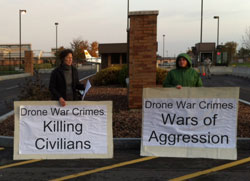 Another feature of Obama’s drone war doctrine is that it provides a new narrative for the president to justify U.S. aggression. Drone warfare does not rely on large numbers of U.S. troops on the ground and large military bases. Rather it relies on small “lily pads,” using drones, Special Forces and mercenaries. For Syria, Obama justifies continuing U.S. interference, while saying, “I do not foresee a scenario in which boots on the ground in Syria, American boots on the ground in Syria,” will be needed. He did not rule out use of drones, open arming of mercenaries by the U.S. or use of NATO troops.
Another feature of Obama’s drone war doctrine is that it provides a new narrative for the president to justify U.S. aggression. Drone warfare does not rely on large numbers of U.S. troops on the ground and large military bases. Rather it relies on small “lily pads,” using drones, Special Forces and mercenaries. For Syria, Obama justifies continuing U.S. interference, while saying, “I do not foresee a scenario in which boots on the ground in Syria, American boots on the ground in Syria,” will be needed. He did not rule out use of drones, open arming of mercenaries by the U.S. or use of NATO troops.
U.S. chauvinism, which says U.S. lives are all that matter, is thus put into play, with Americans encouraged to support use of drones and their massacre of civilians because it means no U.S. troops on the ground. The anti-war movement rejected this stand of the U.S. imperialists, as it stood with the peoples of Iraq and Afghanistan, for example. Now the U.S. rulers are trying to resurrect it, using the claim of possible use of chemical weapons in Syria. We are to become embroiled in a debate of whether the U.S. should openly arm the mercenaries or not, rather than addressing the necessity to end all U.S. aggression and interference as crimes against the peoples.
The U.S. use of chemical weapons is well documented in its wars against Korea, Vietnam (napalm), Iraq and Afghanistan (white phosphorous) and its support for Israeli use of white phosphorous against Palestinians. The experience of the peoples concerning U.S./Israeli aggression and use of chemical weapons makes it difficult for President Obama to now succeed with his narrative about Syria. As well, Obama’s disregard for sovereignty and turning the world into a war zone makes it difficult to secure international support. Obama reflected these difficulties in his press conferences.
He said, for example, “What we now have is evidence that chemical weapons have been used inside of Syria, but we don’t know how they were used, when they were used, who used them.” He added, “If we end up rushing to judgment without hard, effective evidence, then we can find ourselves in a position where we can’t mobilize the international community to support what we do,” (April 30). The U.S. wants to embroil other countries and troops in its aggression, while also covering its empire-building with high ideals, like opposing the use of chemical weapons. As Obama put it, for chemical weapons “there are international rules and protocols and norms and ethics. And when it comes to using chemical weapons, the entire world should be concerned,” (May 3).
It is precisely these rules and norms and ethics that the U.S. has destroyed. Claims of concern about chemical weapons, like concerns about weapons of mass destruction in Iraq or nuclear weapons in Iran, are all means to justify the unfettered use of U.S. powers. It is to justify more crimes against humanity when what is needed is the end to use of force and violence, abroad and at home.
Fight for an Anti-War Government
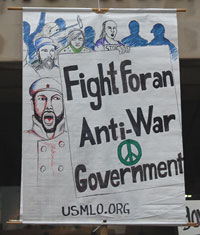 The bombing of Syria by Israel is in part a means to relieve pressure on the mercenaries and vying factions inside Syria, which have not been able to secure the regime change demanded by the U.S. It also makes it appear that the U.S. is not the one attempting to provoke Syria and Iran, while giving Obama an opportunity to claim the problem is Syria, not U.S./Israeli interference. At the same time, it is reflective of the fact that Obama’s drone warfare, with is anarchy and chaos, has put previous arrangements and alliances up for grabs. Equations based on past calculations are of no use. The U.S. no longer needs Israel in the same way it did before, as its main military fortress in the region. It has various other bases and drones in the region. Israel is also maneuvering for its position within the situation, as are other countries in the region. Use of aggression and provocations, arming mercenaries and fomenting civil wars can go completely out of control, triggering broader wars.
The bombing of Syria by Israel is in part a means to relieve pressure on the mercenaries and vying factions inside Syria, which have not been able to secure the regime change demanded by the U.S. It also makes it appear that the U.S. is not the one attempting to provoke Syria and Iran, while giving Obama an opportunity to claim the problem is Syria, not U.S./Israeli interference. At the same time, it is reflective of the fact that Obama’s drone warfare, with is anarchy and chaos, has put previous arrangements and alliances up for grabs. Equations based on past calculations are of no use. The U.S. no longer needs Israel in the same way it did before, as its main military fortress in the region. It has various other bases and drones in the region. Israel is also maneuvering for its position within the situation, as are other countries in the region. Use of aggression and provocations, arming mercenaries and fomenting civil wars can go completely out of control, triggering broader wars.
The reliance of U.S. imperialism on drones coupled with use of black ops to foment civil wars, mayhem and chaos cannot provide security or peace. It is not a way forward. It is a desperate hope born out of anarchy that the U.S. can prevail over its rivals, including both competitors amongst the imperialist powers and against developing nations’ intent on making a way for themselves and against the peoples of the world fighting for their right to be.
It is this fight of the people to affirm rights that is the way forward. The security of any modern nation lies in the fight for the rights of all both nationally and internationally. It requires the end to use of force in resolving conflicts among nations and peoples. In the U.S. it requires stepping up the fight for an anti-war government, one that brings all U.S. troops home and opposes the use of force both abroad and at home.
Use of state terror and violence, abroad and at home, is the source of more insecurity and must be opposed. Already it can be seen that U.S. desperation to prevail means the use of force at home on a far broader scale — as was seen in the police state measures utilized in Boston. . The fight for an anti-war government that affirms the rights of all is what contributes to the well being and security of all.
[TOP]
Cuba Remains Committed to its Irrevocable Decision to Advance its Socialist Development
Speech by Bruno Rodríguez Parrilla, Minister of Foreign Affairs of the Republic of Cuba, at the presentation of the national report to the UN Human Rights Council’s Universal Periodic Review, Geneva, May 1, 2013
Mr. President:
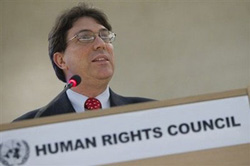 Cuba is honored to present its second National Report to the Human Rights Council Universal Periodic Review (UPR) mechanism. It does so proud of its humanistic work and its achievements in guaranteeing the exercise of all human rights for all its citizens.
Cuba is honored to present its second National Report to the Human Rights Council Universal Periodic Review (UPR) mechanism. It does so proud of its humanistic work and its achievements in guaranteeing the exercise of all human rights for all its citizens.
The economic, political and media blockade imposed by the United States, which Cuba has resisted, undefeated, for more than 50 years, is a massive, flagrant and systematic violation of human rights which provokes damage, shortages and suffering, but it has not detained the country’s equal opportunities, equity in the distribution of wealth, or social justice.
Persistent efforts on the part of the United States to impose a “regime change” on Cuba are a serious violation of the nation’s right to self-determination. These efforts have been unable to prevent the active, democratic and direct participation of its citizens in the construction of constitutional order, in government decisions and in the election of its authorities.
Before this Council is a country without homeless persons or people deprived of dignity, in which no child lacks an education of quality, the sick enjoy sterling medical attention and the elderly social protection. A nation in which the rights of workers, farmers, intellectuals and students are protected by law. A country with citizens’ security, without organized crime, or drugs. Before this Council is a united people, with profound social cohesion. A state in which no one has been executed without trial, tortured or disappeared, and there are no kidnappings or secret prisons.
This exercise coincides with International Workers’ Day, joyfully celebrated in Cuba’s plazas and streets by millions of compatriots and hundreds of friends from all over the world. They do so as free women and men, in defense of rights that have been won. They are not masses of justly angry people, workers on strike, students besieged by education costs and debt, immigrants persecuted by self-interest, racism and xenophobia. We offer our solidarity to all those fighting – everywhere on the planet – for human rights for all, for peace, for development, for the survival of humanity, threatened by colossal military arsenals and climate change.
Mr. President:
This report is the result of a wide-ranging and participative consultation process, which involved countless government institutions, Parliament, civil society organizations and other relevant institutions.
The follow up on the recommendations accepted in the first UPR cycle was the principal objective of the work of the National Group, which coordinated the process and prepared the report.
From Cuba’s first presentation to this mechanism in 2009 through today, significant changes have taken place in the economy and society. Advances have been made in the institutional perfection process, greater citizens’ participation and control as a fundamental aspect of our democracy, and the undertaking to achieve sustainable development with social justice has been maintained.
Cuba remains committed to its irrevocable decision to advance its socialist, national, original, democratic and freely participative socialist development.
We did not come here to present a completed task, nor do we pretend that the Cuban socialist model should be considered for anyone or everyone. Nor do we accept that there is a unique or universal model of democracy, and far less the imposition of the political system of Western industrialized countries that have entered into crisis. We likewise reject the political manipulation, hypocrisy and double standards frequently present in the debate on human rights issues.
Mr. President:
One of the most significant events since the previous session is the adoption by the National Assembly of People’s Power of the Economic and Social Policy Guidelines, which constitute a body of decisions essential to the updating of the Cuban economic and social model and a government program.
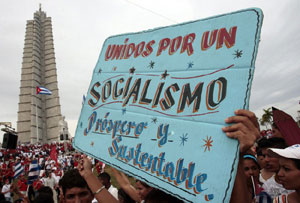 The guidelines were adopted after an extremely wide-ranging popular debate in which millions of Cuban women and men formulated, with total freedom, more than 400,000 amendments modifying two thirds of the draft document, and voted on each one of its 12 chapters. This was a unique experience of citizens’ direct popular consultation in order to reach consensus on government economic, monetary and social policies, in con junction with measures to overcome the effects of the global economic crisis and problems of the Cuban economy without neoliberal austerity formulas, without saving banks at the cost of unjust social cuts.
The guidelines were adopted after an extremely wide-ranging popular debate in which millions of Cuban women and men formulated, with total freedom, more than 400,000 amendments modifying two thirds of the draft document, and voted on each one of its 12 chapters. This was a unique experience of citizens’ direct popular consultation in order to reach consensus on government economic, monetary and social policies, in con junction with measures to overcome the effects of the global economic crisis and problems of the Cuban economy without neoliberal austerity formulas, without saving banks at the cost of unjust social cuts.
Cuba has continued strengthening the democratic nature of its institutionality with laws, policies and programs of a popular and participative nature, in accordance with the people’s aspirations.
New regulations have been adopted to expand the legislative base of human rights, such as those related to social security, housing, employment and exclusively self-employed work, the granting of land in usufruct, among others. In parallel, advances are being made in perfecting and updating the country’s legal system, by implementing a number of modifications responding to the needs of Cuban society and the highest international standards in this context.
Outstanding among these amendments is the Migration and Travel Act, which has had a notable impact and has benefited the Cuban nation’s relations with its émigré community, despite constant manipulation of the migration issue.
Mr. President:
The legal system for the protection of human rights in Cuba is not confined to their constitutional drafting. The system is duly developed and implemented in other substantive, procedural regulations, in accordance with rights recognized in the Universal Declaration and other international human rights instruments.
Cuba has made significant advances in the realization of economic, social and cultural rights. Education is universally accessible and is free of charge at all levels of teaching.
Through its various programs, the Cuban state guarantees every girl, boy and young adult the possibility and right to study within the National Education System and to continue in their education as far as their aptitudes and efforts allow them, with equality of opportunity. The First Vice President of the Council of State and Ministers was invested with the responsibility to protect and supervise children’s rights.
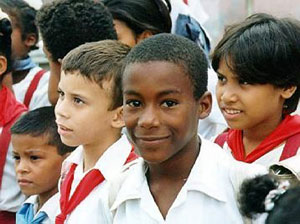 The right to education is assured for every child and young adult with any kind of mental or physical disability through the Special Education Program, in cases where the full integration of differently-abled children in general educational institutions is not possible. Attention is given to these children throughout the country in different forms and at all levels of teaching.
The right to education is assured for every child and young adult with any kind of mental or physical disability through the Special Education Program, in cases where the full integration of differently-abled children in general educational institutions is not possible. Attention is given to these children throughout the country in different forms and at all levels of teaching.
In the most recent UNESCO World Report on the follow-up of Education for All (2012), Cuba appears in 16th place, given its educational development indices. UNESCO recognized Cuba as the Latin American and Caribbean country to direct the highest proportion of its national budget to education.
Under the Martí doctrine of “being educated in order to be free,” Cuba is outstanding in terms of its cultural development, its population’s full access to art and literature, for the preservation and defense of our culture and the enrichment of our spiritual values.
Cuba is equally recognized for its outstanding results and the high quality of its public health system, with universal coverage and free medical attention. With an infant mortality rate of 4.6 per 1,000 live births, Cuba has established indicators higher than those of many industrialized countries. With one doctor for every 137 inhabitants, Cuba is – according to the World Health Organization – the most endowed nation in this sector.
From 2009 through 2011, 19,371 mothers of children with severe disabilities received social security protection, thus giving them the possibility of personally caring for their children.
Attention to older adults is a priority and for that reason, multidisciplinary and cross-sector work is underway to guarantee quality of life for this growing population sector. Life expectancy at birth stands at an average of 78 years. In the next decade, more than 87% of Cubans will have exceeded 60 years of age.
Rights to life, freedom and personal security are sustained by the principle of respect for human dignity and constitute pillars in the conduct of Cuban authorities and the functioning of the entire society.
The five Cuban anti-terrorist fighters who are enduring unjust and long prison terms in the United States lack protection. They were tried without guarantees of due process, in an atmosphere of revenge and hatred, under a slanderous press campaign paid for by the District Attorney’s Office, subjected to prolonged solitary confinement, impediments to their legal defense, cruel, inhuman and degrading treatment, and a number of them have been deprived of visits from their families.
We are deeply concerned at the legal impasse which is sustaining the permanent and atrocious violation of human rights occurring on the illegal Guantánamo Naval Base, Cuban territory usurped by the United States, a center of torture and deaths in custody, where 166 detainees have been held for 10 years, without guarantees, a trial or defense. Currently, 100 of them are on hunger strike, with 17 of these, whose lives are in danger, being force fed through tubes. This prison and military base must be closed and this territory returned to Cuba.
Cuba recognizes, respects and guarantees religious freedoms without discrimination of any kind.
Approximately 400 religions and religious institutions exist in the country.
The freedoms of opinion, expression, access to information and the press are recognized for all citizens. The high educational and cultural level of the people; the social and public nature of communications media; the inexistence of giant for-profit media corporations which in other places impose economic and political interests; the absence of generally stultifying commercial publicity; and the exercise of popular power, all facilitate the material conditions which allow for the enjoyment of these freedoms.
The right to truthful information, free of charge, should be guaranteed by the state. The democratization of the internet, the transference of resources and technology appropriate for social communication, is an urgent need. The technological and content monopoly; the political and military use of networks; linguistic and cultural discrimination must be ended. The digital gap must be closed.
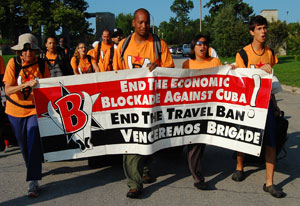 The blockade prevents Cuba from connecting to nearby underwater cables, making services more expensive and access for the population more difficult. It prohibits international providers from supplying Cuba with services, software and technology. Our country is denied, for example, diverse Google services and access to international digital platforms.
The blockade prevents Cuba from connecting to nearby underwater cables, making services more expensive and access for the population more difficult. It prohibits international providers from supplying Cuba with services, software and technology. Our country is denied, for example, diverse Google services and access to international digital platforms.
Between 2010 and 2013, the United States has, as well, allocated $191.7 million dollars to finance organizations, paid agents, the subversive use of information technology and illegal radio and television broadcasts promoting regime change in Cuba. Additionally, millions more are channeled through special services and private groups. Some U.S. allies participate in this effort.
Mr. President:
In Cuba, equality and non-discriminatory policies are fully guaranteed. Advances in terms of gender equality are outstanding. The Cuban government continues to implement numerous laws, policies and programs directed toward reaffirming these.
The percentage of Cuban women in the National Assembly of People’s Power, our Parliament, has reached 48.86%. Cuba occupies second place on a world scale in terms of the percentage of female parliamentarians. For the first time, two women are now Council of State Vice Presidents, and women constitute 41.9% of this body. A third of our ministries are headed by women.
Institutional racism has been eradicated, ample opportunities for development and concrete benefits are provided for less favored sectors, and we are struggling to assure complete, effective equality of opportunity to sectors historically marginalized and to dysfunctional families. Not yet overcome are certain racial prejudices and stereotypes surviving from slavery during our colonial past and a neocolonial regime that institutionalized racism and racial segregation.
Complementary to government efforts and full protection under the law, a decision was made to assign a Council of State Vice President the task of following up on and supervising the struggle against racism and racial discrimination.
We are proud of our African heritage. We share, in a disinterested fashion, the fate of our African brothers and sisters in their battle against colonialism and apartheid.
Another area in which sustained progress is being made is the struggle against discrimination based on sexual orientation. The National Sexual Education Program has incorporated an ongoing educational strategy promoting respect for all sexual orientations and gender identities, establishing multiple opportunities for exchange based on the principles of equality and non-discrimination.
In relation to the promotion and protection of the rights of disabled persons, we have assured that the majority are able to access education and join the workforce. Support is offered in diverse arenas of social activity.
Mr. President:
Cuba’s penitentiary system is based on the principle of human betterment. Cuba fulfils all precepts of the Standard Minimum Rules for the Treatment of Prisoners and prioritizes a preventative focus through a number of social programs, among them those directed toward converting prisons into educational centers.
All inmates are guaranteed medical and dental attention free of charge, under the same conditions as the rest of Cuba’s population. They receive a wage commensurate with the work they perform.
In Cuba, 27,000 inmates, approximately half of the total, are studying at different levels in every penal institution in the country. Many of them are additionally learning a trade. This educational system has supported inmates’ reintegration into society and the workforce.
Mr. President:
Despite shortages and difficulties, in a disinterested fashion, our people have shared and share what we have with other nations, offering solidarity to contribute to the realization of human rights of other peoples around the world.
Since 2004, tens of thousands of citizens have regained their sight through Operation Miracle and 2.4 million ophthalmologic surgeries have been performed in 34 Latin American, Caribbean and African countries.
Since 2005, the (Henry Reeve) International Contingent of Doctors Specializing in Disaster and Serious Epidemic Situations has offered medical assistance to more than three million affected persons.
Cooperation with Haiti, a sister Caribbean country in need of resources for reconstruction and development, has been maintained. More than 12,000 Cuban collaborators have worked there.
Beginning in 2004, cooperation has expanded in literacy learning and development through the Cuban programs Yes, I can (UNESCO King Sejong Prize), I can read and write now and Yes, I can do more. As of November, 2012, 6.9 million people had completed the basic Yes I can literacy program and 976,000 had completed Yes, I can do more.
Mr. President:
Cuba maintains a high level of cooperation and interaction within procedures and structures established by the United Nations in terms of human rights, which are universally applicable, on a non-discriminatory basis.
We have always demonstrated out unequivocal openness to dialogue on all issues, with all states, on the basis of mutual respect, sovereign equality and recognition of the right to self-determination.
Cuba has established a positive dialogue with bodies created in accordance with international treaties in the area of human rights.
Since 2009, five National Reports have been prepared; three of which have been presented before the respective committees. Currently in the final stages of revision are Cuba’s Initial Report in accordance with the Optional Protocol of the Convention on the Rights of Children in relation to the sale of children, child prostitution and the use of children in pornography; as well as our Initial Report in compliance with the Convention on the Rights of Disabled Persons.
Cuba is a signatory to 42 international human rights treaties and has complied with all of their stipulations. Other human rights instruments, including two Pacts, are being studied by relevant authorities.
Our country maintains cooperative relations with diverse humanitarian and human rights organizations throughout the world, both within our own territory and in the development of collaborative missions internationally.
Mr. President:
We are open to constructive, respectful dialogue which adheres to the facts. We will provide necessary information and clarifications. Thank you very much.
[TOP]
Freedom for the Five Cuban Anti-Terrorists
Second “5 Days for the Cuban 5
in Washington, DC”
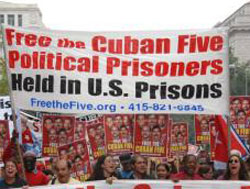 The Cuban Five are five Cuban patriots unjustly imprisoned in the U.S. They organized to prevent terrorism and reported to U.S. authorities the plans of anti-Cuban groups to launch terrorist attacks on Cuba from U.S. soil. For this they were falsely charged, given an unjust trial and jailed for now more than 10 years.
The Cuban Five are five Cuban patriots unjustly imprisoned in the U.S. They organized to prevent terrorism and reported to U.S. authorities the plans of anti-Cuban groups to launch terrorist attacks on Cuba from U.S. soil. For this they were falsely charged, given an unjust trial and jailed for now more than 10 years.
The International Committee for the Freedom of the Cuban 5 is calling on everyone to attend the second “5 Days for the Cuban 5” in Washington, DC from May 30 to June 5. Organizers report that a number of parliamentarians, lawyers, trade unionists, activists and supporters of the Cuban Five from all over the world have confirmed their participation. The “5 Days for the Cuban 5” will focus on how to increase awareness of the case of the Cuban Five and win their immediate release from their unjust imprisonment, which began with their arrest on false charges by the U.S. government.
For more information or to endorse the event, email apoyojornada@gmail.com or visit www.freethefive.org/calendar.htm
Below is a preliminary agenda.
Thursday May 30
9am: Press Conference. Father Miguel D’Escoto, Wayne Smith and other guests. Place: National Press Club, 529 14th Street NW, 13th Floor, Washington, DC.
All day long: Booth with information about the Cuban 5 at the Latin American Studies Association (LASA) conference. Place: Washington Marriott Wardman Park, 2660 Woodley Road NW, Washington, DC.
3pm: Welcoming and orientation meeting for the 5 Days for the Cuban 5 participants, (Place TBA)
Friday May 31
All day long: Booth with information about the Cuban 5 at the Latin American Studies Association (LASA) conference. Place: Washington Marriott Wardman Park, 2660 Woodley Road NW, Washington, DC.
7pm: Reception (Place TBA)
Saturday June 1
1pm: Rally in front of the White House. So far buses are being organized from New York City and Quebec. An important delegation of Cubans living in Miami have confirmed their participation as well as people from Vancouver, Toronto, Chicago, and other cities across the United States.
6pm: Ecumenical-Cultural Event. Angela Davis, Rev. Joan Brown Campbell, Father Miguel D’Escoto, Father Luis Barrios, Maria León, Members of the Cuban Council of Churches, Nancy Morejon. Also the DC Labor Chorus. Place: Saint Stephen Church, 1525 Newton St. Washington DC.
Sunday June 2
Community Activity for the Cuban 5 in Takoma Park MD (TBA) Hip Hop Cultural Event with Head Roc and other groups (Place TBA)
Monday June 3
9am: Lobby activities. Members of Parliaments from other countries who have confirmed their participation: Father Miguel D’Escoto (Nicaragua) María León (Venezuela), Joan Josep Nuit (Spain) Yeidckol Polevensky (former Vice President of the Mexican Senate), Nidia Díaz (El Salvador), Noam Paech (Germany)
11am: Meeting with attorneys and jurists from the U.S. and abroad. Convened by Martin Garbus, attorney of the legal team of the Cuban 5 with the presence of lawyers from the US and abroad. Sponsored by the National Lawyers Guild, Place: George Town Legal Center, 600 New Jersey Avenue, N.W., Washington, D.C.
6pm: Meeting of labor with the presence of U.S. and rank and file members from abroad. Place: Postal Service Union Hall, 6139 Chillum Place NE, Washington, DC. Special Guest: Dolores Huerta
7pm: Panel of intellectuals, Ignacio Ramonet, Saúl Landau, Salim Lamrani, Miguel Barnet, y Jane Franklin. Lugar: Busboys and Poets, 2021 14th Street, NW.
Tuesday June 4
9am: Lobby activities continue
11am: Reception at Capitol Hill hosted by a U.S. congressman to welcome the Parliamentarians from other countries (Place TBA)
6pm: Presentation of new books on the Cuban 5 and Cuba, Fernando Morais, Arnold August and Stephen Kimber, with special guest Danny Glover. Celebration of Gerardo Hernandez’s birthday. Place: Busboys and Poets, 2021 14th Street, NW
Wednesday June 5
9am: Lobby Activities Continue
1pm: Closing event: Videoconference to connect with family of the Cuban Five. Father Miguel D’Escoto, Dolores Huerta, Maria León, Fernando Morais, Ignacio Ramonet. Place: Embassy of the Bolivarian Republic of Venezuela- Bolivarian Hall, 2443 Massachusetts Avenue, NW, Washington, DC
[TOP]
